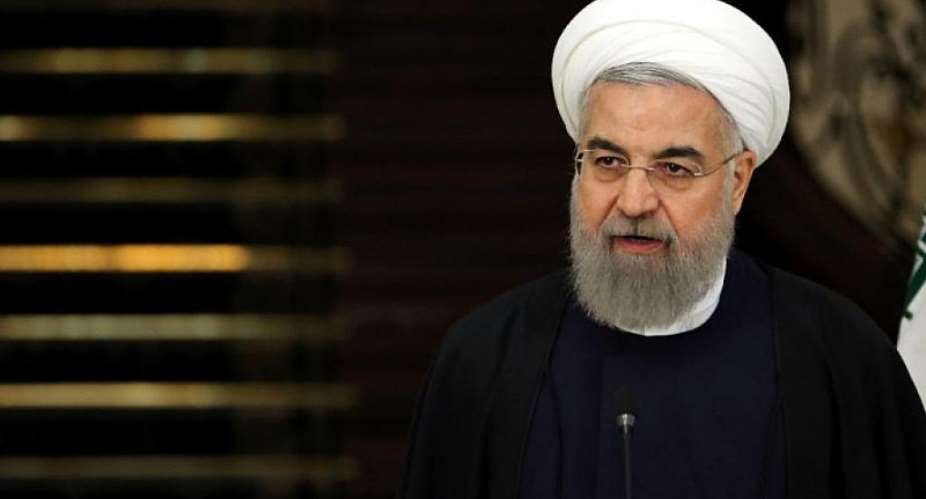Iran's president Hassan Rohani says he is strongly in favor of talks on Tehran's nuclear program. His foreign minister, Mohammad Javad Zarif, came under fire from ultra-conservative media in Tehran after a surprise weekend visit to the G7 summit in Biarritz.
Zarif flew into Biarritz at the invitation of France's foreign minister, Jean-Yves Le Drian. US president Donald Trump had been informed beforehand and “agreed” to the Iranian's visit to the G7.
“It seems that in Iran, everybody is clear that Mr Zarif has a very important mission to talk to Mr Macron about the future of relations between Tehran and Washington,” according to Saeed Laylaz, an economist and a former advisor to reformist former Iranian leader Mohammad Khatami, who was in power between 1995 and 2007.
France has been in favor of maintaining the nuclear deal after the US unilaterally pulled out of the landmark 2015 Joint Comprehensive Plan of Action, an international deal that placed limits on Tehran's nuclear activities in exchange for trade, investment and sanctions relief.
“Because of the big changes in the Persian Gulf, resulting in a semi-cold war between Iran and the US, it seems that both parties are now convinced that they have to talk to each other. There is no other choice. And from the Iranian perspective, President Macron is playing a very important role."
A message of weakness and desperation
But not everyone was happy with the diplomatic initiative. The hard-line Kayhan newspaper was quoted as saying that Zarif's trip was “improper” and sends a message of “weakness and desperation”.
Laylaz rejects the paper's criticism. “We don't believe that Zarif is too weak. It shows the weakness of the Islamic Republic of Iran's position. Diplomacy is diplomacy,” he says, pointing out that Kayhan is critical of the government because it is linked to the hard-line opposition. “Radicals are looking for radical situations, because it gives them a political advantage.”
Meanhwhile, US president Donald Trump seems to be changing his stance on Iran by stressing that the US is not seeking regime change in Iran. Trump told reporters at the G7 summit in Biarritz that he hopes to see “a strong Iran”.
“Both sides see mutual advantages,” says Laylaz. "Military confrontation is impossible. Countries in the region are convinced that they are not able to fight Iran.”
Too soon for Donald Trump
Mohammad Javad Zarif made his surprise appearance at the summit in Biarritz on Sunday for talks with French president Emmanuel Macron, who is seeking to broker a deal between Iran and the United States.
Zarif also met with French and other European diplomats, but Donald Trump said it was "too soon" for him to meet Zarif.
"I knew everything he (Macron) was doing and I approved everything he was doing," Trump said, adding that the French president "asked for my approval".
In early August, Trump lambasted Macron for sending "mixed signals" on Iran, and at the end of July the US administration imposed sanctions on Zarif.
Trump has put in place a policy of "maximum pressure" on Tehran over its disputed nuclear program via crippling sanctions that are seen as increasing the risk of conflict in the Middle East.





 E-Cedi will be used as a weapon to fight money laundering and corruption — Bawum...
E-Cedi will be used as a weapon to fight money laundering and corruption — Bawum...
 Election 20204: Transfer power to us peacefully for your own good — NDC tells NP...
Election 20204: Transfer power to us peacefully for your own good — NDC tells NP...
 Voter registration: Don't bus minors to registration centres — Nana Akomea warn ...
Voter registration: Don't bus minors to registration centres — Nana Akomea warn ...
 Error in registration slip: Trust the Commission on its mandate — EC assure Ghan...
Error in registration slip: Trust the Commission on its mandate — EC assure Ghan...
 Ejisu by-election: NPP aspirant who projected less than 5% votes for Aduomi cong...
Ejisu by-election: NPP aspirant who projected less than 5% votes for Aduomi cong...
 Election 2024: Stolen BVR kits could be used to illegally register people – NDC ...
Election 2024: Stolen BVR kits could be used to illegally register people – NDC ...
 60% of SHSs taken off double track system – Dr Yaw Osei Adutwum
60% of SHSs taken off double track system – Dr Yaw Osei Adutwum
 Voter registration: We hope to hit over one million registered voters in Volta -...
Voter registration: We hope to hit over one million registered voters in Volta -...
 Akufo-Addo not obliged to disclose full KPMG audit report – Presidency
Akufo-Addo not obliged to disclose full KPMG audit report – Presidency
 ECG staff used ransomware to sabotage paperless system, can you imagine they eve...
ECG staff used ransomware to sabotage paperless system, can you imagine they eve...
